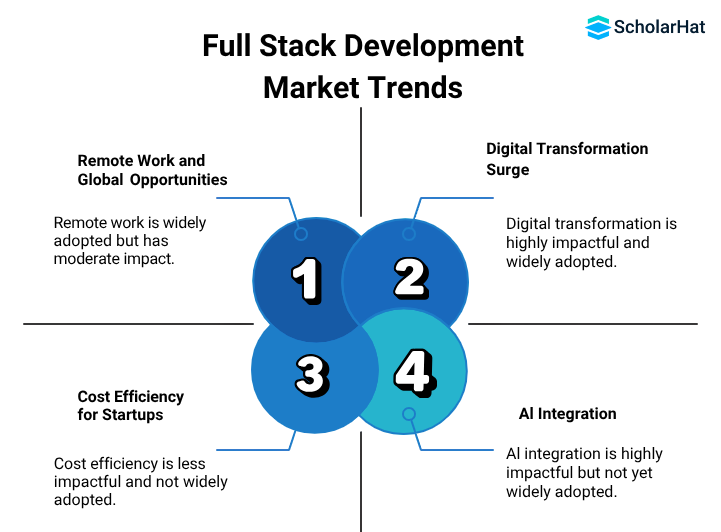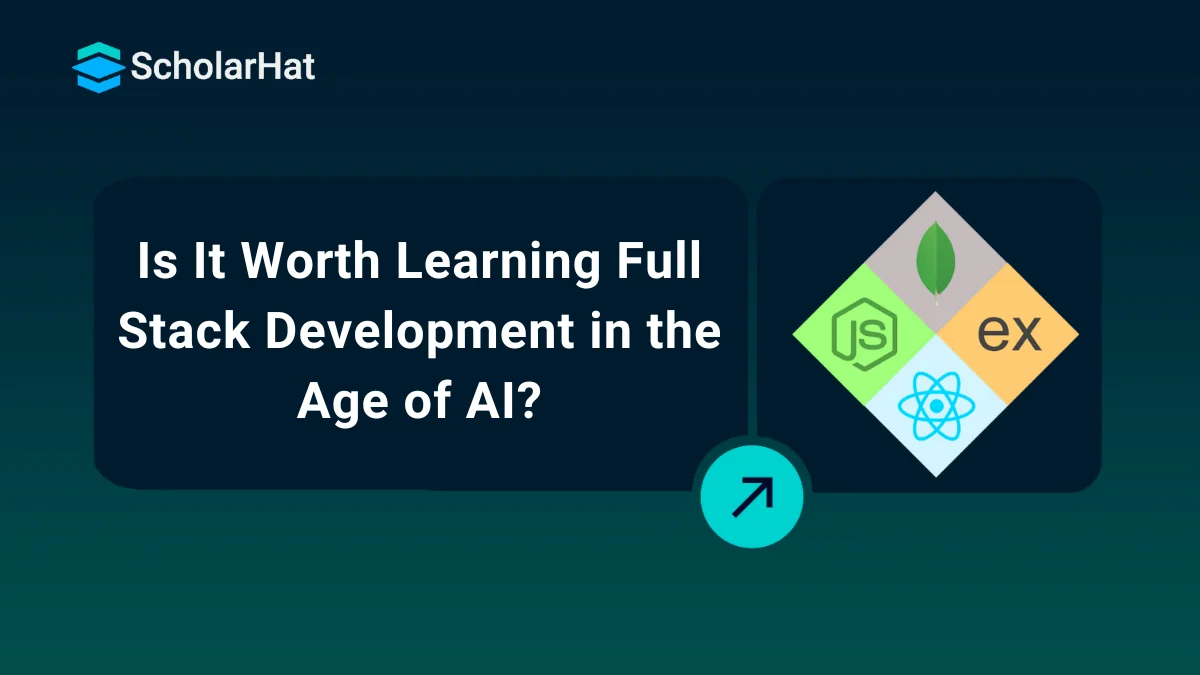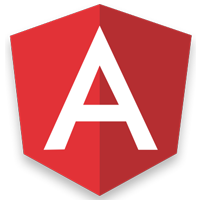06
FebIs It Worth Learning Full Stack Development in the Age of AI?
If you have ever caught yourself thinking, is there any full stack development scope? or Is Full Stack Development Worth Learning in the Age of AI? then its a big YES, Full stack development remains one of the most valuable career paths because it gives you end-to-end expertise, from front-end design to back-end architecture. With this versatility, you’re not just writing code, you’re building, integrating, and optimizing complex applications. By mastering full stack skills, you position yourself to use AI as a powerful accelerator for productivity and innovation, ensuring long-term career growth in a future driven by both AI and human creativity.
Hence in this Full Stack Tutorial, we will understand where is going the future of full stack developers and you should purse it or not specially after AI. Also if you want to start , go with our Free Courses and take your career to next level.
| Read More: Full Stack Developer Roadmap - A Beginner Guide [2025] |
The Current Landscape of Full Stack Development
The tech landscape in 2025 is marked by digital transformation, remote work, and AI integration. Several trends highlight why full stack developers remain in high demand:

- Digital Transformation Surge: Businesses across industries like fintech, healthcare, e-commerce. They are embracing digital platforms. The U.S. Bureau of Labor Statistics projects 17,900 new web development jobs annually through 2033, driven by the expansion of web-based services
- AI Integration: AI is not replacing full stack developers but enhancing their roles. Companies like Microsoft and Google are hiring “AI-enabled full stack developers” who integrate AI models, chatbots, and automation into web applications. The global AI market is projected to reach $2 trillion by 2030, increasing the need for developers who can bridge AI and web development.
- Cost Efficiency for Startups: Startups and SMEs prefer full stack developers to reduce hiring costs. Instead of employing separate front-end and back-end specialists, a single full stack developer can handle both, speeding up project delivery.
- Remote Work and Global Opportunities: The rise of remote work has globalized the job market. Platforms like Upwork and Fiverr report a surge in demand for full stack developers, particularly in regions like India and Eastern Europe, where cost-effective talent thrives.
- Progressive Web Applications (PWAs): PWAs, combining web and mobile app features, are gaining popularity for their offline capabilities and fast load times. Full stack developers are key to building these responsive, user-friendly applications.
These trends show that full stack development is not fading but adapting, with AI acting as a catalyst for new opportunities rather than a threat.
Statistics on Full Stack Developer Demand
Data underscores the robust demand for full stack developers in 2025:
- Job Growth: The U.S. Bureau of Labor Statistics projects a 17.9% growth in software developer employment from 2023 to 2033, significantly outpacing the 4% average for all occupations. Full stack developers, as a subset, benefit from this trend due to their versatility.
- Job Postings: According to Bloomberry’s analysis of 20 million job postings, full stack developer roles remain steady, with a 30% year-over-year increase in postings reported by some sources. While AI-related roles grew 143% since 2024, full stack development holds strong in industries like e-commerce and fintech.
- Global Demand: In India, the tech hub of Asia, the demand for full stack developers is rising, with a projected 13.4% CAGR in web development roles. India’s AI market is expected to reach $17 billion by 2027, with full stack developers who know AI integration commanding premium roles.
- AI’s Impact: A PwC report notes that 73% of U.S. companies use AI, increasing the need for developers who can integrate AI into web systems. Full stack developers with AI skills are particularly sought after, with hybrid roles emerging.
- Cybersecurity and Cloud: With 94% of businesses vulnerable to cybercrime, full stack developers proficient in cloud platforms (AWS, Azure) and DevSecOps are in short supply, with 514,000 new cybersecurity postings in the U.S. last year.
These stats highlight that while AI is reshaping the tech job market, full stack developers remain essential, especially those who upskill in AI and related fields.
Salaries for Full Stack Developers in 2025
Full stack developer salaries reflect their high demand and versatility. Salaries vary by region, experience, and specialization:
- United States: According to Glassdoor, the average base salary for full stack developers is $124,427 annually, with top earners exceeding $150,000. In high-cost cities like San Francisco or New York, salaries can reach $200,000 for senior roles.
- India: UpGrad reports average salaries of ₹6 lakh ($7,200) per year, with experienced developers earning up to ₹14 lakh ($16,800). AI-integrated full stack roles command higher pay.
- Europe: In Europe, salaries range from €70,000 to €110,000 ($78,000–$123,000), with demand high in tech hubs like Berlin and London.
- Freelance Market: Platforms like Upwork show freelancers earning $50–$150 per hour, with remote work expanding opportunities globally.
- AI Specialization Boost: Developers with AI skills, such as integrating machine learning models or chatbots, can earn 20–30% more, as companies value hybrid expertise.
Salaries have remained stable despite inflation, but specialization in AI, cloud, or cybersecurity can significantly boost earnings. The projected 17% growth in software developer roles by 2033 ensures long-term earning potential.
Career Opportunities for Full Stack Developers
Full stack developers enjoy diverse career paths, amplified by AI’s influence and market needs:
- Startups and SMEs: These organizations favor full stack developers for their ability to build entire applications, offering roles in rapid prototyping and MVP development.
- Enterprise Roles: Tech giants like Google and Amazon hire full stack developers for cloud-based projects, often requiring AI integration for features like personalized user experiences.
- Freelancing and Remote Work: The global shift to remote work has opened opportunities on platforms like Fiverr, where developers can work on international projects, from e-commerce platforms to SaaS products.
- Hybrid AI Roles: Positions like “AI-enabled full stack developer” are emerging, requiring skills in React, Node.js, and AI frameworks like TensorFlow or PyTorch.
- Entrepreneurship: AI democratization allows full stack developers to create their own SaaS platforms or startups, leveraging tools like low-code AI platforms to automate business processes.
Opportunities are abundant, but competition is fierce, especially for junior roles. Since 2022, over 300,000 tech layoffs have flooded the market with experienced developers, making portfolios and niche skills critical for standing out.
What is Full Stack Development?
At its core, full-stack development involves the creation and maintenance of the complete web stack. This includes the user interface, the business logic, the server, the network, and data management.
The most common stacks include the MEAN stack (MongoDB, Express.js, Angular, and Node.js), the MERN stack (MongoDB, Express.js, React, and Node.js), and the full stack .Net environment which is pivotal for developers looking to harness the power of Microsoft's .NET framework in web development.
Skills to Stay Competitive
To thrive in 2025, full stack developers must upskill in high-demand areas:
- Core Technologies: Master JavaScript (React, Angular, Vue.js), Node.js, Python, and databases (SQL, MongoDB).
- AI and Machine Learning: Learn basics of TensorFlow, PyTorch, or NLP to integrate AI features like chatbots or recommendation systems.
- Cloud and DevOps: Proficiency in AWS, Azure, Docker, and Kubernetes is essential for cloud-native applications.
- Cybersecurity: With rising cyber threats, skills in secure coding and DevSecOps are in demand.
- Soft Skills: Communication, problem-solving, and teamwork are crucial for collaborating with cross-functional teams and clients.
Contributing to open-source projects, earning certifications (e.g., AWS Certified Developer), and building a portfolio with AI-integrated projects can set you apart.
Challenges in the Job Market
Despite high demand, full stack developers face challenges:
- Competition: Layoffs since 2022 have increased competition, particularly for junior roles, as experienced developers apply for mid-level positions.
- Skill Evolution: AI and cloud technologies evolve rapidly, requiring continuous learning to stay relevant.
- AI Misconceptions: Some fear AI will replace developers, but it’s more about augmentation developers must focus on skills AI can’t replicate, like strategic thinking.
Overcoming these challenges involves staying updated via platforms like Stack Overflow, attending workshops, and networking on LinkedIn or GitHub.
| Enhance your full-stack skills with the following certification programs: |
Benefits of Learning Full Stack Development
Despite the rise of AI, the demand for full-stack developers continues to grow. Here are several reasons why learning full-stack development remains a worthwhile endeavor.
- Versatility: Full-stack developers possess skills in both front-end and back-end development, making them adaptable to various projects and roles.
- End-to-End Solutions: They can develop entire applications independently, from user interface design to database management, streamlining development processes.
- Efficiency: Full-stack developers understand the entire software stack, enabling them to troubleshoot and optimize applications more effectively.
- Career Growth: Mastery of full-stack development opens doors to diverse job opportunities and higher earning potential in the ever-evolving tech industry.
- Integration with AI: Full-stack developers can seamlessly integrate AI technologies into applications, enhancing user experiences and functionality.
Future Outlook for Full Stack Developers
- Bright Career Outlook : Full stack developers who adapt to AI and emerging technologies will stay highly relevant.
- Massive Job Creation : The World Economic Forum predicts 97 million new jobs by 2025, many in tech and hybrid roles.
- In-Demand Skills : Developers with expertise in AI, cloud, and cybersecurity will lead the next wave of innovation.
- AI in Software Market Growth : The AI in software development market is projected to reach $3.77 billion by 2025, signaling strong demand for AI-integrated solutions.
- Global Opportunities : Remote work and international hiring let developers work for global companies without relocating.
- Business Demand : As companies prioritize agility and cost-efficiency, full stack developers remain indispensable.
- AI as an Enabler : AI automates routine tasks and enhances developer productivity rather than replacing developers.
- Job Growth & Salaries:Projected job growth is 17.9% with average U.S. salaries around $124,427.
- Career Flexibility: Roles available in startups, enterprises, freelancing, and remote-first companies.
- Path to Success:Upskill in AI, cloud, and cybersecurity, build strong portfolios, and focus on real-world projects to thrive.
- Future-Proof Career : Embrace AI as a tool and position yourself at the forefront of web development’s exciting future.
AI as a Tool, Not a Replacement
AI technologies are tools that enhance the capabilities of full-stack developers rather than replace them. Developers who learn to integrate AI into their applications can offer more innovative solutions and maintain a competitive edge in the job market.
While AI algorithms can process vast amounts of data and perform tasks with speed and accuracy, they lack the nuanced understanding, empathy, and creativity inherent in human intelligence. Therefore, embracing AI as a complementary tool allows humans to leverage their strengths while exercising judgment, critical thinking, and ethical considerations to ensure its responsible and beneficial use in solving complex problems and advancing society.
Conclusion
So, Is it worth learning full-stack development today? Absolutely. The role of a full-stack developer continues to be critical in the tech ecosystem. Despite the advances in AI, the unique blend of skills required in full-stack development cannot be fully automated or replaced.
The integration of AI in software development is more about augmentation than replacement. Full-stack developers can ensure they remain invaluable in an AI-driven future by continuing to develop a broad range of skills and adapting to new technologies. If you want to also grab that 7 figure salary then start with our below courses.
FAQs
Take our Fullstack skill challenge to evaluate yourself!

In less than 5 minutes, with our skill challenge, you can identify your knowledge gaps and strengths in a given skill.












